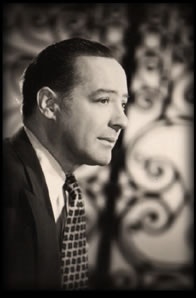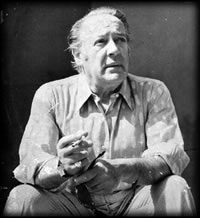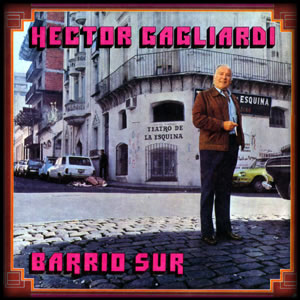By
Gagliardi - Interview to Héctor Gagliardi, The Sad One

his archetypal Buenos Aires inhabitant began his career in the early forties and immediately, thanks to the radio and his appearances in clubs and theaters, started to establish himself into what years later became a character of the Buenos Aires mythology. His métier was to describe touching scenes of daily life through simple verses that exalted a melodramatic feeling thanks to the best and irreplaceable instrument that he possessed, his voice, with its so peculiar inflections, as if he were speaking during an endless sigh or were almost sobbing.
 «I was born on 900 Lima Street, in the neighborhood of Constitución. My family was very poor and Dad died when I was a kid. As soon as I finished school I began to work. In my youth we moved to San Telmo and I began to frequent a coffee on the corner of Defensa and Chile. When the boys and I misbehaved, the owner suspended us, either he didn't allow us to enter or he didn't serve us coffee. It was a time when with two pesos in your pocket you were the master of the world, but to get them was quite hard. At age twenty, inspired by the atmosphere of that neighborhood, I began to write poems. The first one was “Media noche [b]” that Troilo musicalized later but he never recorded it. The “Media noche” he committed to disc is another one, the one written by Méndez and Tavarozzi. Thereafter also with Pichuco I made “Claro de luna”, unpublished, and “Vencido” with music by Oreste Cúfaro that D'Arienzo recorded with Alberto Echagüe. As well “Matrimonio”, with music by the singer Roberto Carlés, was recorded by the same interpreters.
«I was born on 900 Lima Street, in the neighborhood of Constitución. My family was very poor and Dad died when I was a kid. As soon as I finished school I began to work. In my youth we moved to San Telmo and I began to frequent a coffee on the corner of Defensa and Chile. When the boys and I misbehaved, the owner suspended us, either he didn't allow us to enter or he didn't serve us coffee. It was a time when with two pesos in your pocket you were the master of the world, but to get them was quite hard. At age twenty, inspired by the atmosphere of that neighborhood, I began to write poems. The first one was “Media noche [b]” that Troilo musicalized later but he never recorded it. The “Media noche” he committed to disc is another one, the one written by Méndez and Tavarozzi. Thereafter also with Pichuco I made “Claro de luna”, unpublished, and “Vencido” with music by Oreste Cúfaro that D'Arienzo recorded with Alberto Echagüe. As well “Matrimonio”, with music by the singer Roberto Carlés, was recorded by the same interpreters.
«We became close friends with Celedonio Flores, I even lived in his house on Loyola Street when he was newlywed. I worked as bill-collector in an important company and he did the same for a nearby enterprise. When he was busy with his things I helped him with his money collections and many times I typed his manuscripts, I even came to know his poems better than he did. He was my idol and as he was twenty years my senior, he treated me as if I were his son. Thanks to his advice I was polishing my poetry. He was the best man at my wedding and he took me to all places. Guided by his hand, I recited for the first time in public. It was in a restaurant on the Carabelas thoroughfare, after an impressive stew. There was a group of important actors, they were Alippi, Petrone, Magaña. Also, Homero Manzi who made one of his speeches, later came Celedonio who, when he finished, announced: “Now I will introduce you to a Buenos Aires poet that will recite his things for you” and I climbed on a chair. Several of them knew me but they didn't have an idea of what I did. They loved it. Then Tito Martínez del Box, who by then was the producer of the program sponsored by Jabón Federal, approached me. He asked me if it was true that the poems were mine and later he wanted to know how many I had written. I answered that they were approximately about forty. And he insisted. “Are they forty, yes or not?”. He suggested that the following morning I would see him on the radio. “Your things may work”. I asked Celedonio's advice. “You can't miss going there, maybe there is your future”.
«The following morning I arrived at Radio Belgrano on time. While I was waiting some well-dressed gentlemen, speaking of a poet that was kind of a modern Evaristo Carriego, passed by. Tito Martínez came to me and led me to a studio and there those gentlemen were: “All right, recite your poems to them!” I didn't have experience. I made “Cinco guitas”, “El almacén”, “El sapito” and, when I looked up, I saw that all the guys were crying, Tito included.
«When the summer of 1941 began the Jabón Federal radio program was devoted to tango and they included me. Tito asked me to send him some photos and as I was a tenderfoot I sent two used for identification cards, those 4 cm x 4 cm photos. He almost killed me, and as I had no money for studio pictures, in the magazines specialized in the radio milieu I appeared quite small next to the stout Azucena Maizani, the star of the program.
 «The debut was on January 5, 1941. I had just written “Reyes magos” that dealt about war, kids, and toys. The program was aired at noon on Sundays, everybody had relatives in Europe that was on war. It was a boom, a consecration, I made many people taste their noodles bitter. A week later Tito called me to pick up the mail that had arrived at the radio. There were two full bags of letters. When I returned home my wife and I hugged each other and we began to cry due to the emotion, in some envelopes there were handkerchiefs, little medals, small illustrations. It was by then that they nicknamed me The Sad One.
«The debut was on January 5, 1941. I had just written “Reyes magos” that dealt about war, kids, and toys. The program was aired at noon on Sundays, everybody had relatives in Europe that was on war. It was a boom, a consecration, I made many people taste their noodles bitter. A week later Tito called me to pick up the mail that had arrived at the radio. There were two full bags of letters. When I returned home my wife and I hugged each other and we began to cry due to the emotion, in some envelopes there were handkerchiefs, little medals, small illustrations. It was by then that they nicknamed me The Sad One.
«The owner of the radio was Yankelevich, he liked me very much and soon he offered me to work in another program. It was called Mediodía Porteño, with Francisco Canaro's orchestra and they offered me to write the scripts. It was a smash hit and we continued until the end of the year. We also made a tour of Tucumán and Santiago del Estero with the whole cast of the radio. They hired a special train and on it were Filiberto, Lomuto, the Santa Anita jazz band and so many others. I wondered if my stuff would be of any interest in the provinces. When I appeared before the audience and I recited “Cinco guitas”, “La bolita [b]”, “La maestra” I was rewarded with an ovation. The program sponsored by Federal was broadcast in the whole country. I was the star of the embassy.
«My career was very quick, my first book Puñado de emociones appeared the same year of my debut on radio. Another great friend, Alberto Vacarezza, wrote its foreword. Julio Korn published it, with only two thousand copies. I didn't pay much attention to it and for fifteen days I didn't turn up at the publishing house, I was busy with another thing. But I came across the manager on the street, they had been looking for me. My little books had been soon sold out and they were already printing ten thousand more. Subsequently they published Versos de mi ciudad, Por las calles del recuerdo, with foreword by Homero Manzi, Esquina de barrio, with preface by Cátulo Castillo, and later El sentir de Buenos Aires. In total, with them all, a million and a half copies.
 «But success didn't spoil me, to such an extent that only in 1944, when with a great picture of mine at the door I began to work at El Tronío. I was the only Argentine among so many Spanish figures, then I quit my work as bill-collector. Then I worked for a company that sold oil for cooking. I remember that sometimes when I entered the grocery shops and I saw my photo upon a radio set, they paid me and I left saying nothing. They not even imagined that I was the one of the picture. Only once, a client in Chacarita told me that I looked like The Sad One. Full of pride I told her that he was the one that was in front of her. The woman laughed and she exclaimed: “What a good joke! You, The Sad One?, are you kidding? please”. People thought that those that worked on radio were supermen, not people in flesh and blood. Never again did I identify myself, I let them think that The Sad One was a myth, an unreachable being.
«But success didn't spoil me, to such an extent that only in 1944, when with a great picture of mine at the door I began to work at El Tronío. I was the only Argentine among so many Spanish figures, then I quit my work as bill-collector. Then I worked for a company that sold oil for cooking. I remember that sometimes when I entered the grocery shops and I saw my photo upon a radio set, they paid me and I left saying nothing. They not even imagined that I was the one of the picture. Only once, a client in Chacarita told me that I looked like The Sad One. Full of pride I told her that he was the one that was in front of her. The woman laughed and she exclaimed: “What a good joke! You, The Sad One?, are you kidding? please”. People thought that those that worked on radio were supermen, not people in flesh and blood. Never again did I identify myself, I let them think that The Sad One was a myth, an unreachable being.
«With my work as reciter I began to earn in one day what I got in one month as bill-collector. And I was appearing everywhere, at the Maipo theater, with Adolfo Stray and Fidel Pintos, at night venues, at other theaters, on radio, on television, I made a tour throughout all Latin America and I stayed a long season in Mexico. I recorded several long-playing records with my rhymes.
«I know that they say that my rhymes are not at the level of the great poets, but I don't worry about. I am simply a sincere creator that sings of the things that he knows and loves. In my lines there are neither tricks nor lies. They are realities that I knew of a city full of charms that now it also has them, but time before it was more family-like, we knew each other more, we were pals, down Corrientes Street we greeted ourselves from sidewalk to sidewalk. I don't know how to define my poetry with accuracy, but I can assure you that the people understand it well.» *
At the beginning of 1984 he had an offer to appear in Mar del Plata. He was not in good health and his doctor advised him not to work, but he disobeyed him. There he commented to his friends that he felt as if he were worn-out and so it was in fact. His life was wasted away by time. Somebody wrote some day: How cruel is time that makes poetry an everlasting thing while it destroys poets!
His poems that were musicalized and committed to record were: “Alergia” (milonga) with Enrique Francini, “Primer beso” (waltz) with music by Carlos Dante and Pedro Noda, “Humilación [b]” with Pedro Vergez, “Perdoname hermano” (Forgive me, brother), with Edgardo and Osvaldo Donato, “Uruguay yo te saludo”, with Donato Racciatti, “Yo te recuerdo tranvía”, with Leopoldo Federico and the above mentioned: “Vencido”, “Matrimonio”, “Media noche [b]” and “Claro de luna”. There is a broadcast by Aníbal Troilo of his tango “Media noche [b]”, with Aldo Calderón on vocals, unfortunately, the audio quality is poor.
* Excerpted from the newspaper La Opinión of Sunday August 4, 1974.